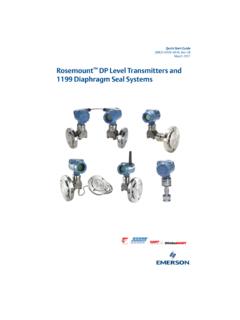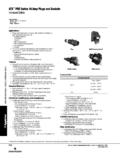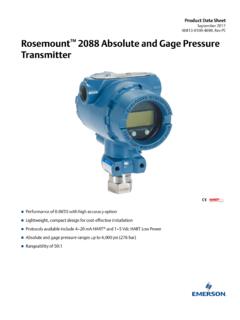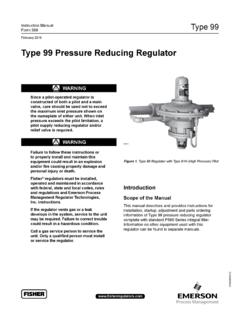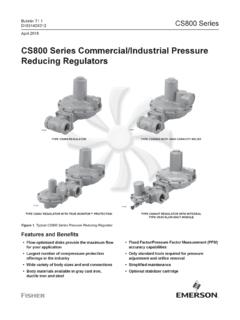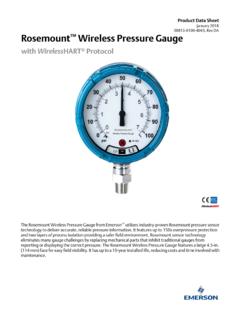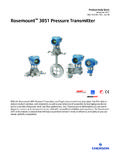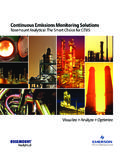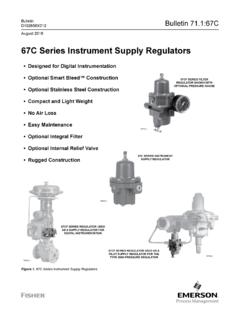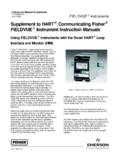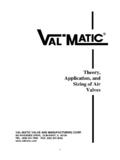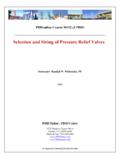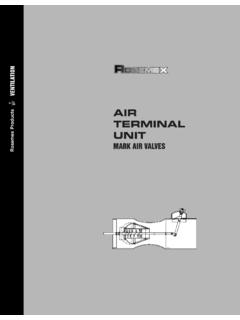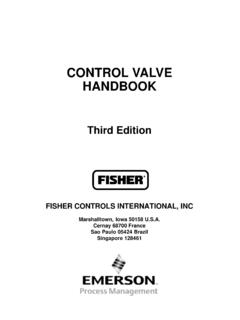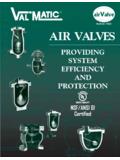Transcription of Product Bulletin: ACE95 and ACE95Sr Tank Blanketing Valves
1 Bulletin : ACE95 June ACE95 and ACE95Sr Tank Blanketing ValvesFeatures Fully Balanced Pilot Design Reduces Inlet Pressure Sensitivity Frictionless Pilot Valve Bubble Tight Shutoff Pilot Controlled Angled or In-Line Body Option Self-Contained Highly Sensitive Diagnostics Available Vacuum Settings Available Stainless Steel Construction AvailableFigure 1. Type ACE95 Tank Blanketing ValveW9133W8155 Figure 2. Type ACE95Sr Tank Blanketing ValveBulletin :ACE952 SpecificationsThe Specifications section lists the specifications for Types ACE95 and ACE95Sr Tank Blanketing Valves .
2 Factory specification is stamped on the nameplate fastened on the valve at the and End Connection Styles Type ACE95 Angled Body(1): 3/4 NPT 1 NPT NPS 1 / DN 25, CL150 RF NPS 1 / DN 25, CL300 RF NPS 1 / DN 25, PN 16/25/40 RF NPS 1 / DN 25, Sanitary Flange In-Line Body: 3/4 NPT 1 NPT NPS 1 / DN 25, CL150 RF NPS 1 / DN 25, CL300 RF NPS 1 / DN 25, PN 16/25/40 RF NPS 1 x 2 / DN 25 x 50, CL150 RF NPS 1 x 2 / DN 25 x 50, PN 16/25/40 RF NPS 1 / DN 25, Sanitary Flange Type ACE95Sr Angled Body(1): 2 NPT NPS 2 / DN 50, CL150 RF NPS 2 / DN 50, CL300 RFMaximum Operating Inlet Pressure(2) 200 psig / barMaximum Emergency Outlet (Casing) Pressure(2) 20 psig / bar Maximum Operating Outlet Pressure(2) psig / barOutlet Pressure Ranges -5 in.
3 To psig / -12 to barMinimum and Maximum Differential Pressures(2) Minimum: 25 psi / bar Maximum: Up to 200 psi / bar depending on main valve spring (See Table 6)Main Valve Flow Characteristic LinearPressure Registration ExternalAccuracy Typically within in. / 1 mbar when flowing 5 to 70 percent of advertised capacitiesTemperature Capabilities(2) Nitrile (NBR): -20 to 180 F / -29 to 82 C Fluorocarbon (FKM): 0 to 212 F / -18 to 100 C Ethylenepropylene (EPDM - FDA): -20 to 212 F / -29 to 100 C Perfluoroelastomer (FFKM): -20 to 212 F / -29 to 100 CIEC Sizing Coefficients Type ACE95 (3): Type ACE95Sr : XT: XT: FD: FD: FL: FL: Km: Km: Coefficients for Relief Valve Sizing Type ACE95 : Type ACE95Sr .
4 Cv 1 use Cv Cv 20 use Cv 22 Cv 2 use Cv Cv 45 use Cv 50 Cv 4 use Cv Cv 60 use Cv 66 Cv use Cv Cv 10 use Cv 11 Construction Materials Body: CF3M/CF8M Stainless steel Trim: 304 Stainless steel and 316 Stainless steel Elastomers: Nitrile (NBR), Fluorocarbon (FKM), FDA-Ethylenepropylene (FDA-EPDM) or Perfluoroelastomer (FFKM) Diaphragm: Fluorinated ethylene propylene (FEP) Actuator: 316 Stainless steel or Carbon steelApproximate Weights (with all accessories) Type ACE95 : 40 lbs / 18 kg Type ACE95Sr : 60 lbs / 27 kg1. Various Single Array Manifold (SAM) tank connections are also available. Contact your local Sales Office for more The pressure/temperature limits in this Bulletin or any applicable standard limitation should not be For NPS 1 / DN 25 body size, all :ACE953 IntroductionTank Blanketing is the process of using a gas, such as nitrogen, to maintain a slightly positive pressure in an enclosed storage tank.
5 Tank Blanketing prevents a stored Product from vaporizing into the atmosphere, reduces Product combustibility and prevents oxidation or contamination of the Product by reducing its exposure to air. Tank Blanketing is utilized with various products, including: adhesives, pharmaceuticals, pesticides, fertilizers, fuels, inks, photographic chemicals and food ACE95 and ACE95Sr Valves are self-contained, fully balanced, pilot-operated and are used for accurate pressure control on tank Blanketing systems. These Valves help control emissions and provide protection against atmospheric contamination. Types ACE95 and ACE95Sr Valves maintain a positive tank pressure which reduces the possibility of tank wall collapse during pump out operations, prevents stored Product from vaporizing to atmosphere.
6 The Type ACE95Sr uses an angled body in either a 2 NPT, CL150 RF or CL300 RF and is taller than the Type and Benefits Pilot Controlled ACE95 Series Valves are pilot operated which results in a high degree of accuracy and control. Fully Balanced Pilot Eliminates setpoint changes caused by variations in inlet pressure. Large Actuator Large actuator diaphragm increases sensitivity to tank pressure changes. Rolling Pilot Diaphragm The rolling diaphragm balances the pilot valve and eliminates friction, resulting in extremely accurate control. Diagnostic Port Allows field analysis of valve operation, simplifying maintenance and reducing service costs.
7 Options and Accessories Inlet Pressure Gauge Displays pressure of Blanketing gas supply to the tank Blanketing valve. Control Pressure Gauge Low-pressure gauge to measure control pressure (tank pressure). Purge Meter (Rotameter) Maintains a small amount of flow through the sensing and/or main line. Prevents corrosive tank vapors from damaging upstream equipment. Pressure Switch Allows installation of an alarm system to indicate low or high-pressure on the tank. Outlet Check Valve Prevents corrosive gases and vapors from flowing back into the Blanketing system through the delivery line.
8 Diagnostic Gauge Allows analysis of valve operation in the field, simplifying service and reliability. Single Array Manifold (SAM) Provides sense line connection and main valve connection through a single tank nozzle. (Not compatible with In-Line end connection).Principle of OperationTypes ACE95 and ACE95Sr tank Blanketing Valves control the vapor space pressure over a stored liquid. When liquid is pumped out of the tank or vapors in the tank condense, the pressure in the tank decreases. Tank pressure is sensed by the large actuator diaphragm. When tank pressure is less than the valve set pressure, spring force moves the actuator diaphragm the actuator moves downward, it pushes open the pilot valve which allows loading pressure to flow into the tank.
9 As loading pressure decreases, inlet pressure is able to overcome the force of the main valve spring, opening the main valve. See Figure pressure in the tank increases above setpoint, the large actuator diaphragm is pushed upward, allowing the pilot to close. Loading pressure equalizes with inlet pressure closing the main pilot valve is balanced (inlet pressure creates equal upward and downward force on these components); therefore, the outlet pressure of the unit is not affected by fluctuating inlet :ACE954 VALVE OPENINLET PRESSURETANK PRESSUREATMOSPHERIC PRESSUREINLET BLEED PRESSUREF igure 3. Type ACE95 Operational SchematicVALVE CLOSEDB ulletin :ACE955 Thermal EquationsFor tanks up to 840,000 gallons / 3179 m3 capacity, use one of the following equations:Equation 1:Qthermal [SCFH Air] = Vtank x 2:Qthermal [SCFH Nitrogen] = Vtank x x 3:Qthermal [Nm3/h Air] = Vtank x 4:Qthermal [Nm3/h Nitrogen] = Vtank x x , For Equations 1 and 2: Vtank = tank volume, gallons For Equations 3 and 4: Vtank = tank volume, m3 For tanks greater than 840,000 gallons / 3179 m3 capacity: See Table on the method, there can be a significant difference in the calculated required capacity.
10 No matter which method is used, the tank must be equipped with supplemental venting to protect the tank, Product and personnel in cases of equipment failure, fire exposure or other conditions that could cause the tank pressure or vacuum to exceed operating InformationCapacity information (Tables 2, 3, 4 and 5) are based on specific gravity nitrogen. Nitrogen is the most common Blanketing gas. Should you use a different gas, convert the tabular values as follows: For Blanketing (pad) gases other than nitrogen, multiply the given nitrogen flow rate values by the conversion factors in Table 3. For gases of other specific gravities, multiply the given nitrogen flow rate by and divide by the square root of the appropriate specific Blanketing Valves are often installed in locations that are difficult to access.
